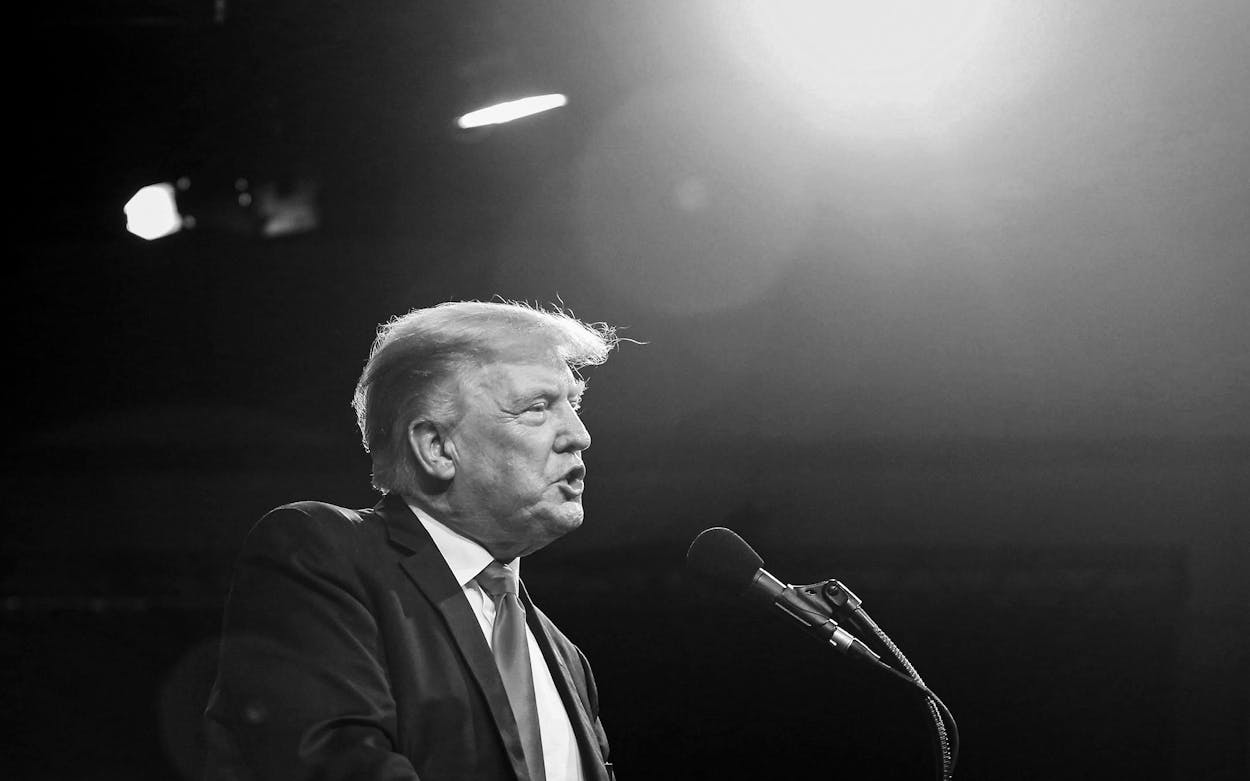On Saturday evening, Donald Trump will hold his first official rally of the 2024 campaign cycle. He won’t be doing so in his home state of Florida, however. Nor will he address a crowd of potential swing voters in Michigan, Pennsylvania, or Wisconsin. No, the twice-impeached former president will formally launch his third bid for the office at Waco Regional Airport—less than ten miles northwest of the heart of the city, along a remote stretch of land broken up mostly by a smattering of McLennan County’s finest gas stations, oil-change shops, and self-storage facilities. As presidential campaign kickoff events go, it’s an unlikely spot.
One particular detail about the event, however, has attracted some extra attention since the rally was announced: it’ll happen in the midst of the thirtieth anniversary of the 51-day standoff between federal agents and the Branch Davidian cult. Trump may not actively seek to draw comparisons between himself and cult leader David Koresh, but he has made it clear that he sees himself as the target of unjust overreach by federal agents, a common claim made by those on the far right about the events that took place outside of Waco back in the spring of 1993. And some of both his critics and supporters have noticed the parallel. Far-right conspiracy theorist Laura Loomer, a Trump supporter, posted that she considered the choice of location for the event “very symbolic!”
What kind of symbol is it, though? Heidi Beirich, cofounder of the Global Project Against Hate and Extremism, noted in an interview with USA Today this week that “Waco is hugely symbolic on the far right,” and that “there’s not really another place in the U.S. that you could pick that would tap into these deep veins of anti-government hatred.” Mary Trump, the former president’s niece and a famously outspoken critic of her uncle, said in a tweet Thursday night that hosting the rally in Waco is “a ploy to remind his cult of the infamous Waco siege of 1993, where an anti-government cult battled the FBI. Scores of people died. He wants the same violent chaos to rescue him from justice.”
The months-long standoff in Waco was a radicalizing event for many in the anti-government movement; Oklahoma City bomber Timothy McVeigh, who killed 168 people in 1995, cited “what the U.S. government did to Waco” as part of his motivation for the attack. Trump, meanwhile, has increasingly made common cause with anti-government types since losing his 2020 bid to remain in the government’s highest office. In addition to inspiring an insurrection against that government in an attempt to remain in power, and then portraying those who were convicted of their crimes as wrongfully imprisoned martyrs, Trump’s own beef with the same Justice Department whose ATF and FBI were on the ground at the Branch Davidian compound thirty years ago has escalated since his South Florida beach club was raided last year in an attempt to recover classified documents. He’s declared federal agents to be “vicious monsters,” echoing rhetoric he has used against rank-and-file members of the FBI since even before his presidency ended, when he called them “scum.”
If Trump’s appearance in Waco, timed to the anniversary of the siege, is a coincidence, in other words, it’s one that involves sympathetic bedfellows. Steven Cheung, a spokesperson for the former president, issued a statement earlier this week that suggests, however, that the campaign would like to be able to maintain some deniability about that coincidence. (Unless, of course, Trump himself chooses to call attention to it during the speech, which is always a possibility.) “President Trump is holding his first campaign rally in Waco in the Super Tuesday state of Texas because it is centrally located and close to all four of Texas’ biggest metropolitan areas—Dallas/Ft. Worth, Houston, Austin, and San Antonio—while providing the necessary infrastructure to hold a rally of this magnitude,” the statement read. “This is the ideal location to have as many supporters from across the state and in neighboring states attend this historic rally.”
Texas is indeed a state that holds its primary on Super Tuesday; whether this rally will make a critical difference in Trump’s pursuit of the GOP nomination a year from now is hard to suss out, though. Waco’s proximity to the four metro areas, meanwhile, is a little more suspect. It’s roughly ninety minutes from both Austin and Dallas, but a good three-hour drive from Houston or San Antonio. Trump could probably get more bang for his buck if he were to come to Austin proper, which would eliminate all travel time for residents of one of those four cities; it would also cut San Antonians’ travel times in half and shave half an hour or so from the drives of most Houstonians. (DFW residents, meanwhile, would have to drive about as far as folks from Houston and San Antonio will in order to get to Waco.) The Texas capital city also has plenty of infrastructure to host a Trump rally—and he’s held a couple in Austin over the years.
But Waco it will be, and the city is busy preparing for the event. At a press conference on Thursday, local officials said they’re anticipating as many as 15,000 attendees for the standing room–only rally, with parking starting at 8 a.m. for those who want to tailgate before the evening speech. Roads around the area will be closed to ensure safe transportation, while airport passengers will have access to a dedicated travel route to ensure that the former president’s appearance doesn’t hinder access to their flights. And—perhaps having learned a lesson from El Paso—Waco officials have also noted that the rally’s security costs have been paid in full in advance. What’ll be harder to predict is the collective mood of crowd members drawn to Waco during the anniversary of an anti-government flash-point event as an anti-government presidential candidate rallies them together.
- More About:
- Politics & Policy
- Donald Trump
- Waco








